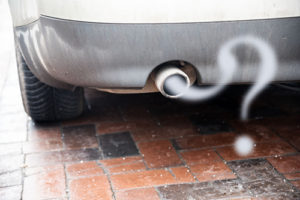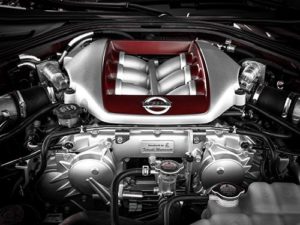No one needs to tell you that when your car is working correctly, you shouldn’t see any smoke coming out of your exhaust. When something isn’t quite right in your engine, though, there are actually several colors you can see in your exhaust smoke. Blue, grey, black, and white smoke colors each have a different cause. Today, we’re going to talk about what white smoke coming out of your exhaust means.
White Smoke: When To Worry
 You may be surprised to learn that there are, in fact, occasions when white smoke coming out of your exhaust is completely normal. The key here is density and duration.
You may be surprised to learn that there are, in fact, occasions when white smoke coming out of your exhaust is completely normal. The key here is density and duration.
- Is the smoke more like vapor or mist? Does it appear when you first start your car up and then go away quickly? Is it also cold outside? If so, you don’t have to worry about anything. It’s most likely condensation.
- Is the smoke dense like fog? Does it continue flowing out of your exhaust for as long as your car is on? Worse, does it also smell like something is burning? If so, it’s time to make an appointment with your mechanic.
If you’ve run through this checklist and still aren’t sure whether or not to be concerned, it’s a good idea to give your mechanic a call.
The Most Common Causes Of White Smoke Coming Out Of Your Exhaust
Now that we’ve addressed when not to be concerned about the white cloud behind your car, let’s talk about situations that fit into the second category, where your car produces dense white exhaust the entire time it’s running.
1. Your EGR cooler is bad
Your Exhaust Gas Recirculation (EGR) cooler is part of your exhaust system that helps reduce emissions. A bad EGR cooler can drain coolant into the exhaust system, where the combination of exhaust and coolant causes the white cloud behind your vehicle. If your EGR cooler is bad, you will need a replacement.
2. Your vehicle has a cracked cylinder head or bad head gasket
 When working properly, your vehicle’s head gasket prevents coolant from getting to the cylinders in your engine. If your head gasket develops a crack or has a poor seal, it can let coolant get into the cylinder. There, the combination of engine oil and coolant leads to white smoke coming out of your exhaust. The cost and extent of repairs for this issue will depend on the exact issue present in your engine.
When working properly, your vehicle’s head gasket prevents coolant from getting to the cylinders in your engine. If your head gasket develops a crack or has a poor seal, it can let coolant get into the cylinder. There, the combination of engine oil and coolant leads to white smoke coming out of your exhaust. The cost and extent of repairs for this issue will depend on the exact issue present in your engine.
3. Your coolant tank is leaking
A leaking coolant tank is another possible cause of white smoke, although this problem is usually seen coming from the engine compartment and not the exhaust pipe. It’s rare for your coolant tank to leak, but when it does, it’s important to get a replacement since your coolant keeps your engine working at a normal temperature.
4. Your fuel injectors aren’t working like they should
 Your car’s fuel injectors are responsible for delivering a precise amount of fuel to the engine. If these parts become faulty for any reason, then excessive fuel burn can result in greyish or white smoke coming from your exhaust.
Your car’s fuel injectors are responsible for delivering a precise amount of fuel to the engine. If these parts become faulty for any reason, then excessive fuel burn can result in greyish or white smoke coming from your exhaust.
Your engine control unit – the computer that tells your fuel injectors when and how much fuel to inject into the cylinders – can also cause white smoke. In these cases, an error with the timing and/or the amount of fuel being injected into the vehicle’s cylinders is the culprit.
Other Causes Of White Smoke Coming Out Of Your Exhaust
 In addition to the causes we’ve listed above, there are a few more possible reasons that there is white smoke coming out or your exhaust.
In addition to the causes we’ve listed above, there are a few more possible reasons that there is white smoke coming out or your exhaust.
- Leaking transmission fluid or antifreeze
- Oil leak (this generally causes blue smoke, but can produce white smoke in some vehicles)
- A cracked engine block
Fast and Convenient Auto Repair With T3 Atlanta
As you can see, there are quite a lot of potential reasons that can lead to white smoke coming out of your exhaust. If you want a definitive answer without the hassle of diagnosing the problem yourself, call T3 Atlanta. Our experienced, friendly mechanics can quickly assess your Nissan, Lexus, Infiniti, or Toyota and find the cause of the issue. Give us a call today at either our convenient Smyrna or Decatur location and we’ll pen you in for an appointment!










Leave a Reply
You must be logged in to post a comment.